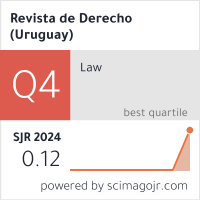Reflexiones generales sobre la adopción del estandar internacional relativo al informe país por país introducido por el plan BEPS
Palabras clave:
Crisis financiera, Plan BEPSResumen
1. Introducción. 2. Antecedentes históricos: 2.1 Principales hitos en el desarrollo del Plan BEPS y la introducción del Informe País por País, 2.2 La influencia de la Unión Europea y otros stakeholders en el Informe País por País, 2.3 La posición de Uruguay en este contexto. 3. La problemática BEPS en materia de precios de transferen-cia como antesala a las Acciones 8 a 10 y 13. 4. La Acción 13: Documentación de Precios de Transferencia: 4.1 Documentación integral, 4.2 Objetivos de la documentación, 4.3 Contenido de los informes, 4.4 Acceso a la información contenida en dichos informes. 5. Implementación del Informe País por País como estándar mínimo: 5.1 Introducción general, 5.2 Modificaciones introducidas a la legislación doméstica, 5.3 Principios subya-centes en la implementación de este estándar. 6. Reflexiones finales.
Descargas
Citas
BIAC (2014): OECD Discussion Draft on Transfer Pricing Documentation (TPD) and Country by Country (CbC) Reporting.
BIAC (2014): “The Business Contribution to the OECD Ministerial Council Meeting”, 6-7 de mayo de 2014, Paris. Biac.org.
BIAC (2017): Beps Position Paper.
BLANCO, Andrés: “Soberanía fiscal y el plan BEPS de la OCDE: Un problema de legitimidad”. Revista Tributaria Nº 253, IUET, Montevideo, 2016.
Brauner, Yariv. (2014): What the BEPS? Florida Tax Review
Calderón, M. & Palacín R. (2015): Guía OCDE/G20 BEPS sobre el nuevo estándar de documentación de precios de transferencia & country-by-country reporting. EY Abogados.
Calderón Carrero, José Manuel (2018): “La incidencia de la globalización en la configuración del ordenamiento tributario del siglo XXI”. Derecho Tributario Internacional Económico, Aduanero, Contable y Ambiental, en homenaje al profesor Paulo de Barros Carvalho. Ediciones Legales E.I.R.L., Lima, Perú, 2018.
Carbajo Vasco, Domingo. (2015): El plan de acción de la iniciativa BEPS. Una perspectiva empresarial. Crónica Tributaria.
Cockfield, A. & MacArthur, C. (2015): Country-by-country reporting and commercial confidentiality. Canadian Tax Journal.
Corral Guadaño, Ignacio. (2016): Manual de Fiscalidad Internacional. Instituto de Estudios Fiscales Manuales de la Escuela de la Hacienda Pública. VOL I y II.
Dharmapala, Dhammika. (2014): What do we know about base erosion and profit shifting? A review of the empirical literature. CESifo Working Paper No. 4612
Evers, Meier & Spengel. (2014): Transparency in financial reporting: Is country-by-country reporting suitable to combat international profit shifting? ZEW Centre for European Economic Research.
Evers, Meier & Spengel. (2016): Country-by-country reporting: Tension between transparency and tax planning. ZEW Centre for European Economic Research.
Hugh J. Ault, Wolfgang Schon, & Stephen E. Shay, Base Erosion and Profit Shifting: A Roadmap for Reform, 68 Bull. Int’l Tax’n 275 (2014).
Jiménez, A. & Calderón, J. (2014): El plan de acción de la OCDE para eliminar la erosion de bases imponibles y el traslado de beneficios a otras jurisdicciones (BEPS): ¿el final, el principio del final o el final del principio? Revista El Derecho, Universidad Católica Argentina.
Knobel, Andres. (2018): Country by country reports: why “automatic” is no replacement for “public”. Tax Justice Network
https://www.taxjustice.net/2018/07/17/country-by-country-reports-why-automatic-is-no-replacement-for-public/
Krumholz, Elise. (2015): BEPS Action 13: Standardized transfer pricing documentation. Tesis. Faculty of Law, Lund University.
Martinez García, David. (2017): Hacia un nuevo paradigma de responsabilidad y transparencia contable y fiscal global. Revista Internacional Transparencia e Integridad, España.
MAZZ, Addy: “Plan de acción BEPS. Estado actual”. Revista Tributaria Nº 253, IUET, Montevideo, 2016, páginas 569-570.
Murphy, R. (2016): Country-by-country Reporting. In: T. Pogge & K. Mehta (Eds.), Global Tax Fairness. (pp. 96-112). Oxford University Press. ISBN 9780198725343
Murphy, R. (2012): Why you have to support country by country reporting now - my speech this morning. Tax Research UK http://www.taxresearch.org.uk/Blog/2012/05/02/why-you-have-to-support-country-by-country-reporting-now-my-speech-this-morning/
Murphy, R. (2014): Country by country reporting. Tax Justice Network Limited.
OCDE (1998): “Harmful Tax Competition”.
OCDE (2011): Transfer Pricing Guidelines for Mutlinational Enterpriese and Tax Administrations.
OCDE (2013): Public consultation: Draft handbook on transfer pricing risk assessment.
OCDE (2013): Draft Handbook on transfer pricing risk assessment.
OCDE (2013): Action plan on base erosion and profit shifting.
OCDE (2013): Addressing base erosion and profit shifting.
OCDE (2014): Nota explicativa. Proyecto OCDE/G20 sobre la erosión de la base imponible y el traslado de beneficios.
OCDE (2014): 2014 Deliverables.
OCDE (2015): Resúmenes Informes Finales. Proyecto OCDE/G20 sobre la erosión de la base imponible y el traslado de beneficios.
OCDE (2015): Combatir las practicas fiscales perniciosas, teniendo en cuenta la transparencia y la sustancia. Proyecto de la OCDE y del G-20 sobre la erosión de la base imponible y el traslado de beneficios.
OCDE (2015): 2015 Final Reports.
OCDE (2017): BEPS action 13 on country-by-country reporting. Peer Review Documents.
OCDE (2017): Inclusive Framework on BEPS: Progress report.
OCDE (2017): Country-by-country reporting XML schema: User guide for tax administrations.
OCDE (2017): Country-by-country reporting status message XML schema: User guide for tax administrations.
OCDE (2017): Transfer Pricing Guidelines for Mutlinational Enterpriese and Tax Administrations.
OCDE (2018): Report of the Ad Hoc advisory task force on the direction and priorities of working party 1 and working party 6.
OCDE (2018): Country-by-country reporting - Compilation of peer review reports (Phase 1) Inclusive framework on BEPS: Action 13.
OCDE (2018): OCDE/G20 Inclusive Framework on BEPS. Progress report July 2017-June 2018.
OCDE (2018): Guidence on Country-by-Country reporting. Inclusive framework on BEPS: Action 13.
OCDE (2018): Peer review and monitoring process of the four minimum standards.
ONU (2015): United Nations Conference on Trade and Development: “Reforming International Investment Governance”, World Investment Report (2015).
OXFAM (2017): Making tax vanish, how the practices of consumer goods MNC RB show that the international tax systems is broken. Oxfam Briefing Paper, julio 2017.
Picciotto, Sol (2014): “Informe sobre erosión de la base tributaria y deslocalización de beneficios (BEPS), implicancias para los países en vía de desarrollo”. Tax Justice Network, enero de 2014.
Picciotto, Sol (2016): “The G20 and the Base Erosion and Profit Shiting (BEPS) Project”. Trabajo realizado con Agustina Gallardo, Jeffery Kadet, Markus Henn y Maria Villanueva para el Grupo de Monitoreo BEPS. Discussion Paper 18/2017, Deutsches Institut für Entwicklungspolitik, DIE, Bonn, Alemania, 2017.
Santos, María José y Gzech Beghloldh, Valentina (2018): “El futuro de Precios de Transferencia en Uruguay”. Revista Tributaria Nº 262, IUET, Montevideo, 2018.
Van Wyk, Lindie. (2015): Master of commerce in taxation in the field of international tax. University of Cape Town.
Wanyana Oguttu, Annet. (2015): OECD’s action plan on tax base erosion and profit shifting: Part 1 - What should be Africa’s response? IBFD
Descargas
Publicado
Cómo citar
Número
Sección
Licencia
Derechos de autor 2020 María José Santos

Esta obra está bajo una licencia internacional Creative Commons Atribución 4.0.


















 Esta obra está bajo una licencia de
Esta obra está bajo una licencia de 